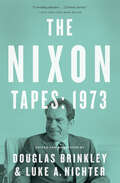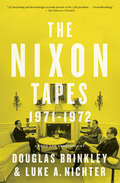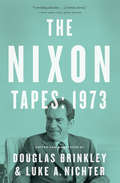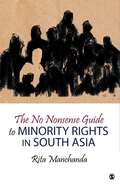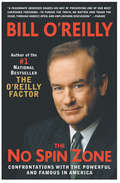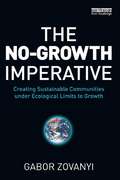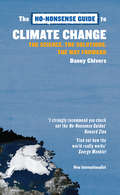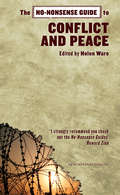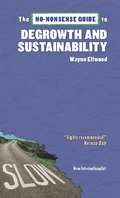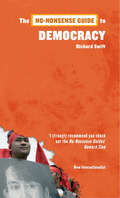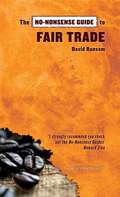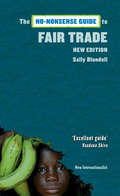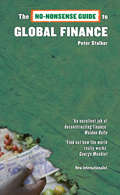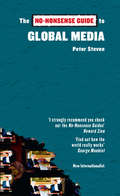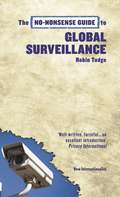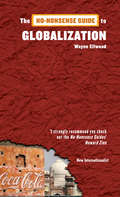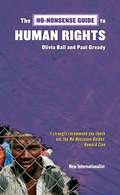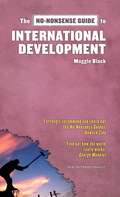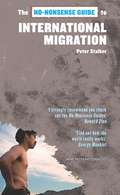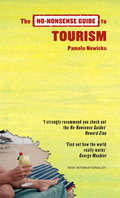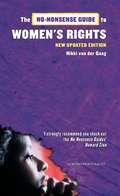- Table View
- List View
The Nixon Tapes (With Audio Clips): 1973 (WITH AUDIO CLIPS)
by Douglas Brinkley, Luke A. NichterWith audio clips included, this &“revealing&” transcription captures a dark and dramatic year in presidential history—and the words of Richard Nixon himself (The New York Times Book Review). Between 1971 and 1973, President Richard Nixon&’s voice-activated tape recorders captured 3,700 hours of conversations. Douglas Brinkley and Luke Nichter&’s intrepid two-volume transcription and annotation of the highlights of this essential archive provides an unprecedented and fascinating window into the inner workings of a momentous presidency. The Nixon Tapes: 1973 tells the concluding chapter of the story, the final year of taping, covering such events as the Vietnam cease-fire, the Wounded Knee standoff, and, of course, the Watergate investigation. Once again, there are revelations on every page. With Nixon&’s landslide 1972 reelection victory receding into the background and the scandal that would scuttle the administration looming, The Nixon Tapes: 1973 reveals the inside story of the tragedy that followed the triumph.
The Nixon Tapes: 1971–1972
by Douglas Brinkley Luke NichterThe famous -- and infamous -- Nixon White House tapes that reveal President Richard Nixon uncensored, unfiltered, and in his own words President Nixon's voice-activated taping system captured every word spoken in the Oval Office, Cabinet Room, and other key locations in the White House, and at Camp David -- 3,700 hours of recordings between 1971 and 1973. Yet less than 5 percent of those conversations have ever been transcribed and published. Now, thanks to professor Luke Nichter's massive effort to digitize and transcribe the tapes, the world can finally read an unprecedented account of one of the most important and controversial presidencies in U.S. history. The Nixon Tapes, with annotations and commentary by Nichter and Professor Douglas Brinkley, offers a selection of fascinating scenes from the year Nixon opened relations with China, negotiated the SALT I arms agreement with the Soviet Union, and won a landslide reelection victory. All the while, the growing shadow of Watergate and Nixon's political downfall crept ever closer. The Nixon Tapes provides a unique glimpse into a flawed president's hubris, paranoia, and political genius.
The Nixon Tapes: 1971–1972 (With Audio Clips)
by Douglas Brinkley, Luke A. NichterAn enhanced edition of this &“fascinating&” collection of White House transcripts, including audio clips of some of the most newsworthy conversations (San Francisco Chronicle). This &“treasure trove&” of transcripts documents two years of Richard Nixon&’s presidency and takes you directly inside the White House, through the famous—and infamous—Nixon White House tapes that reveal for the first time the president uncensored, unfiltered, and in his own words (TheBoston Globe). President Nixon&’s voice-activated taping system captured every word spoken in the Oval Office, Cabinet Room, other key locations in the White House, and at Camp David—3,700 hours of recordings between 1971 and 1973. Yet less than five percent of those conversations have ever been transcribed and published. Now, thanks to historian Luke Nichter&’s massive effort to digitize and transcribe the tapes, the world can finally read an unprecedented account of one of the most important and controversial presidencies in US history. This volume of The Nixon Tapes offers a selection of fascinating scenes from the period in which Nixon opened relations with China, negotiated the SALT I arms agreement with the Soviet Union, and won a landslide reelection victory. All the while, the growing shadow of Watergate and Nixon&’s political downfall crept ever closer. The Nixon Tapes provides a never-before-seen glimpse into a flawed president&’s hubris, paranoia, and political genius—&“essential for students of the era and fascinating for those who lived it&” (Kirkus Reviews, starred review).
The Nixon Tapes: 1973
by Douglas Brinkley, Luke A. NichterThis &“revealing&” transcription captures a dark and dramatic year in presidential history—and the words of Richard Nixon himself (The New York Times Book Review). Between 1971 and 1973, President Richard Nixon&’s voice-activated tape recorders captured 3,700 hours of conversations. Douglas Brinkley and Luke Nichter&’s intrepid two-volume transcription and annotation of the highlights of this essential archive provides an unprecedented and fascinating window into the inner workings of a momentous presidency. The Nixon Tapes: 1973 tells the concluding chapter of the story, the final year of taping, covering such events as the Vietnam cease-fire, the Wounded Knee standoff, and, of course, the Watergate investigation. Once again, there are revelations on every page. With Nixon&’s landslide 1972 reelection victory receding into the background and the scandal that would scuttle the administration looming, The Nixon Tapes: 1973 reveals the inside story of the tragedy that followed the triumph.
The No Nonsense Guide to Minority Rights in South Asia
by Rita ManchandaThe No Nonsense Guide to Minority Rights in South Asia is a practical primer on issues related to minority rights in South Asian countries. It delves into all major concepts and cutting edge theories that constitute the evolving minority rights discourse. The ‘minority’ in South Asia is typically characterized by ‘non-domination’ and powerlessness, two major markers apart from language, culture, religion and ethnicity. This book explores the process of this kind of ‘minoritization’ in the region, evaluating the weaknesses of constitutional and legal frameworks that contribute to it. In doing so, it examines in detail the State’s role in the socio-political recognition, protection and exclusion of minorities. By taking a rights-based approach, the book argues that nation-building in South Asia has been devoid of the commitment to expand the democracy and equality agenda and has instead been dominated by majoritarian and authoritarian policies. While elaborating on such politics of recognition and inequality, the author goes on to explore and analyze the ethnic composition of each South Asian country—India, Pakistan, Nepal, Bangladesh, Sri Lanka and Bhutan. She also highlights the role of minority agencies in resisting injustice and exclusion, thus providing a comparative and holistic understanding of the minority discourse in the region. This book is an important reference resource for students and academics working in the areas of politics and international relations, especially on human rights, minority rights and state-building. It will also be a useful guide for activists.
The No Spin Zone: Confrontations with the Powerful and Famous in America
by Bill O'ReillyOn the heels of his runaway New York Times bestseller, The O'Reilly Factor, Bill O'Reilly delivers another strong dose of no-holds-barred advice and the unvarnished truth for America.Bill O'Reilly is even madder today than when he wrote his last book The O'Reilly Factor-and his fans love him even more. He's mad because things have gone from bad to worse, in politics, in Hollywood, in every social stratum of the nation. True to its title, The No-Spin Zone cuts through all the rhetoric that some of O'Reilly's most infamous guests have spewed to expose what's really on their minds, while sharing plenty of his own emphatic counterpoints along the way.Shining a searing spotlight on public figures from President George W. Bush and Senator Hillary Clinton to the Reverend Jesse Jackson, Al Sharpton, and his former CBS News colleague Dan Rather, The No-Spin Zone is laced with the kind of straight-shooting commentary that has made O'Reilly the voice of middle America's disenfranchised. Examining sex and violence in the media and the tarnished legacy of the Clintons with the same feistiness as the death penalty (which he opposes) and timid national news organizations that roll over for the powerful, Bill O'Reilly delivers not only his opinions, but the documented attitudes of the country's movers and shakers as well. It demonstrates just why O'Reilly has become the most successful, the most controversial, the most beloved (by some), and the most disliked (by others) figure in television news today_and a culture hero to tens of millions of everyday Americans. And that's fact, not spin.From the Hardcover edition.
The No-Fly Zone in US Foreign Policy: The Curious Persistence of a Flawed Instrument
by Gustav MeibauerThe no-fly zone is a frequently used instrument in the US foreign policy arsenal, despite detrimental, or even catastrophic, results. This book examines why the instrument has such a hold on leaders’ imaginations and rhetoric despite its patchy record in practice. Examining detailed historical case studies from conflicts in Iraq, Bosnia, Kosovo, South Sudan/Darfur, Libya and Syria, the book shows how debates about, and actual use of, no-fly zones in US foreign policy have not been primarily about managing conflict or protecting civilians. Instead, the focus is often on navigating contradictory international and domestic political incentives and constraints, leading to US intervention in an ill-considered and incremental manner.
The No-Growth Imperative: Creating Sustainable Communities under Ecological Limits to Growth
by Gabor ZovanyiMore than two decades of mounting evidence confirms that the existing scale of the human enterprise has surpassed global ecological limits to growth. Based on such limits, The No-Growth Imperative discounts current efforts to maintain growth through eco-efficiency initiatives and smart-growth programs, and argues that growth is inherently unsustainable and that the true nature of the challenge confronting us now is one of replacing the current growth imperative with a no-growth imperative. Gabor Zovanyi asserts that anything less than stopping growth would merely slow today’s dramatic degradation and destruction of ecosystems and their critical life-support services. Zovanyi makes the case that local communities must take action to stop their unsustainable demographic, economic, and urban increases, as an essential prerequisite to the realization of sustainable states. The book presents rationales and legally defensible strategies for stopping growth in local jurisdictions, and portrays the viability of no-growth communities by outlining their likely economic, social, political, and physical features. It will serve as a resource for those interested in shifting the focus of planning from growth accommodation to the creation of stable, sustainable communities. While conceding the challenges associated with transforming communities into no-growth entities, Zovanyi concludes by presenting evidence that suggests that prospects for realizing states of no growth are greater than might be assumed.
The No-Nonsense Guide to Climate Change
by Danny ChiversJust as the need for action on climate change becomes more urgent and overwhelming, the campaign to deny that humans are causing it has gained more traction. This completely new book meets the sceptics head on, offering a guide to the science, an insight into the politics of climate justice and a clear sense of the way forward.
The No-Nonsense Guide to Conflict and Peace
by Sabina Lautensach Helen Ware Deanna Iribarnegaray Peter GreenerThe twentieth century was the most bloody in history, and already conflict in this century has taken a heavy toll. Most wars are now within countries rather than between states, and often it is civilians that suffer most, especially women and children.This is an invaluable guide for students, peace groups, and activists. It examines the changing types of war, including the war on terror and ethnic conflict such as in Rwanda, the role of diplomacy and the UN, and what steps ordinary people are taking to rebuild communities. It offers ideas and inspiration for creating lasting peace.
The No-Nonsense Guide to Degrowth and Sustainability
by Wayne EllwoodThis guide explores the idea of economic growth, tracing its history and questioning why it has become so unchallengeable and powerful when unlimited growth in a finite world is ultimately impossible. It illustrates how economics based on degrowth can be turned into a positive and how we can arrive at new levels of environmental sustainability without having turning the clock back to the Dark Ages. A title for anyone interested in economics, the psychology of consumerism and progressive change.Wayne Ellwood is former co-editor of New Internationalist magazine. He is author of the No-Nonsense Guide to Globalization (over fifty thousand sold).
The No-Nonsense Guide to Democracy
by Richard SwiftFollowing the economic meltdown and the triumph of Barack Obama, have the chances of genuine democracy improved?In this updated edition of The No-Nonsense Guide to Democracy, Richard Swift explores how democracy has been constricted and deformed by economic power brokers and a self-serving political class from Birmingham to Bangalore. He considers the different tools people in power have used to manipulate democratic principles, such as freedom, to their advantage.The book includes chapter-length discussions of topics such as the economic meltdown, Barack Obama, eco-democracy, democratizing the economy, and democracy in the global south. It is also a guide to the rich diversity of forms of elected government, and it contains practical ideas for empowering today's voters around the world.Richard Swift was co-editor for the New Internationalist magazine from 1984 to 2007 and lives in Toronto. He has written and broadcast on questions of ecology and democracy for many years.
The No-Nonsense Guide to Fair Trade
by David RansomMeeting the people who grow our bananas and cocoa and make our clothes, this No-Nonsense Guide to Fair Trade tells the human story behind what we consume. <P><P>Examin-ing the global contest between "free" and "fair" trade, David Ransom argues that the key question is not whether trade should be regulated or deregulated, but whether it is to be the master or servant of the people.And as fair trade products are being turned into brands by large corporations, a new contest opens-it is no longer just a question of fair versus free, but what kind of fair trade.
The No-Nonsense Guide to Fair Trade
by Sally BlundellAn in-depth look at two decades of a movement that aims to challenge the ethical foundations of the global market.Transnational corporations look for the cheapest suppliers, while the fair trade movement insists on a premium for the producers at the start of the chain.Sally Blundell uncovers the origins of fair trade and what it is likely to become.
The No-Nonsense Guide to Global Finance
by Peter StalkerAn incisive introduction to global finance--where money comes from, the current mechanisms, and the need for control and reform. It traces the origins of money as a source of exchange and a store of value and the many weird forms it now takes--visible and invisible.The guide sets recent events into context, indicating how the flows of money directed by an unaccountable elite increasingly shape economic, political, and social activity.Peter Stalker is a former co-editor of the New Internationalist who now works as a consultant to a number of UN agencies. He is author of the No-Nonsense Guide to International Migration.
The No-Nonsense Guide to Global Media
by Peter StevenPeter Steven explores the diversity of world media, from the corporate to the independent. He introduces readers to the political economy of the major media outlets, looking at the concentration of ownership and the convergence of technologies and media functions. In doing so, he encourages us to question how the media reflects society: are we passive recipients, or do we have a part in constructing the world?Peter Steven is a freelance writer based in Toronto, Canada. He has been a film columnist for New Internationalist and The Beaver magazines, and associate editor of Jump Cut magazine.
The No-Nonsense Guide to Global Surveillance
by Robin TudgeSpying, once the province of the KGB, CIA and MI5, has become part of everyday life. Governments routinely trawl our emails, CCTV cameras follow us on every street, while state databases of our DNA become larger all the time. This book shows the extent to which Big Brother is watching us all.
The No-Nonsense Guide to Global Terrorism
by Jonathan BarkerThis is a highly accessible history of terrorism that looks at core examples from the Middle East, instances of state terrorism, and terrorist fringes of political movements. It covers the theories justifying and guiding terrorist acts and the battle of images that accompanies them.Jonathan Barker has taught political science at the universities of Toronto, Arizona, and Dar es Salam. He has researched local politics in Senegal, Tanzania, Uganda, and India. His other books include Street-Level Democracy and Rural Communities under Stress.
The No-Nonsense Guide to Globalization
by Wayne EllwoodGlobalization is all around us. From the richest country to the poorest, every aspect of life is affected by global economics and communications. We all benefit...or do we?This No-Nonsense Guide to Globalization distills the arguments into a clear, concise commentary. It examines the debt trap, the acceleration of neo-liberalism and the "free trade" model, competition for energy resources, and the links between the war on terror, the arms trade, and privatization. It looks at civil society alternatives to corporate globalization and the latest trade justice initiatives.
The No-Nonsense Guide to Green Politics
by Derek WallClimate chaos and pollution, deforestation and consumerism: the crisis facing human civilization is clear enough. But the response of politicians to it has been cowardly and inadequate, while environmental activists have tended to favor single-issue campaigns rather than electoral politics.The No-Nonsense Guide to Green Politics measures the rising tide of eco-activism and awareness and explains why it heralds a new political era worldwide.Derek Wall is a former principal speaker of the British Green Party. He is the author of numerous books, including Babylon and Beyond: The Economics of Anti-Capitalist, Anti-Globalist and Radical Green Movements.
The No-Nonsense Guide to Human Rights
by Paul Gready Olivia BallSince the Declaration of Human Rights over fifty years ago, we acknowledge that universal rights exist, but what does this mean to someone who is tortured or denied education, work, or asylum? This No-Nonsense Guide to Human Rights looks at the theories of rights and universalism. It explores the difficult task of trying to protect human rights in war, the legal advances that have led to some rights abusers facing justice, and the conflicts that can occur when rights collide with culture.
The No-Nonsense Guide to International Development
by Maggie Black"Overseas aid" and "international development" are catch-all terms that cover a multitude of activities--and abuses. This guide explains what "development" actually is--and explores its political and economic roots. It shows what can happen in the name of development and argues for a more organic, social approach with those it seeks to serve as equal partners in the process. Maggie Black has written books for the Oxford University Press, UNICEF, and Oxfam. She has worked as a consultant for UNICEF, Anti-Slavery International, and WaterAid, among others, and has written for the Guardian, The Economist, and BBC World Service.
The No-Nonsense Guide to International Migration
by Peter StalkerVirtually any commodity can move around the world to satisfy demand, but human beings have far less freedom. Many would-be migrants are forced to risk life and limb traveling illegally. Yet most rich countries are short of workers, have shrinking populations, and need more immigrants. This is a timely guide to a major issue that is never far from the political headlines.Peter Stalker is a former co-editor of the New Internationalist who now works as a consultant to a number of UN agencies. He has written two books on migration for the International Labor Organization.
The No-Nonsense Guide to Tourism
by Pamela NowickaThis guide demystifies the often invisible impacts of global tourism, one of the biggest industries in the world, from labor conditions to development by stealth, to the role of elites and the cultural impacts on both the visitor and the visited.It also takes in themes such as the gap year and the role of travel and vacations in Western cultures, and examines the "happy smiling faces" syndrome and asks whether this is just a reworking of old colonial relationships. Pamela Nowicka is a journalist and consultant writing on numerous tourism and ethics subjects.
The No-Nonsense Guide to Women's Rights
by Nikki van der GaagHas the battle for women's rights been won? Not when women still make up 70 percent of the world's poor. This guide examines the advances that have been made and looks beneath the surface to find out what the reality is for women all around the world.<P><P> It shows how, in this "post-feminist" age, women's rights are still very much an issue.Nikki van der Gaag is a freelance writer, editor, and evaluator on development issues. Prior to this, she was editorial director at the Panos Institute and co-editor of the New Internationalist magazine.
